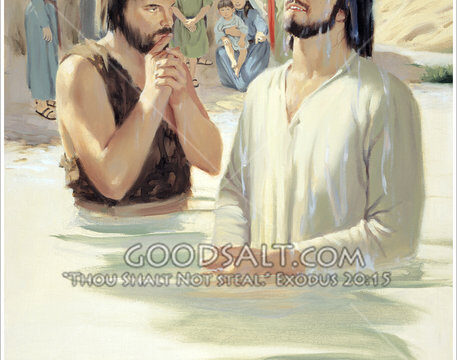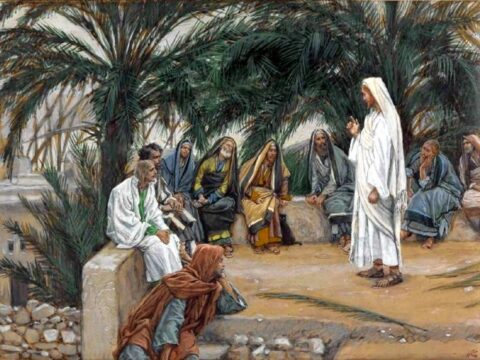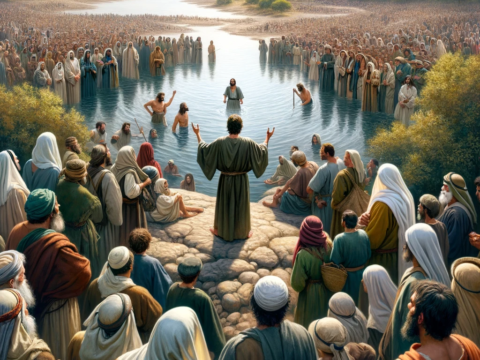Acts 8 brings up the Problems of Salvation & Cross-Denominational Discipleship Models. Several issues are raised by this passage from Acts, namely the problems of Salvation and Denominational Differences. Asking for Salvation is the key to entering the kingdom of God?
Acts: 8 Problems of Salvation & Denominational Discipleship
The Church Persecuted and Scattered
On that day a great persecution broke out against the church in Jerusalem, and all except the apostles were scattered throughout Judea and Samaria. 2 Godly men buried Stephen and mourned deeply for him. 3 But Saul (Later know as Paul the Apostle), began to destroy the church. Going from house to house, he dragged off both men and women and put them in prison.
Philip in Samaria
4 Those who had been scattered preached the word wherever they went. 5 Philip went down to a city in Samaria and proclaimed the Messiah there. 6 When the crowds heard Philip and saw the signs he performed, they all paid close attention to what he said. 7 For with shrieks, impure spirits came out of many, and many who were paralyzed or lame were healed. 8 So there was great joy in that city.
Simon the Sorcerer
9 Now for some time a man named Simon had practiced sorcery in the city and amazed all the people of Samaria. He boasted that he was someone great, 10 and all the people, both high and low, gave him their attention and exclaimed, “This man is rightly called the Great Power of God.” 11 They followed him because he had amazed them for a long time with his sorcery. 12 But when they believed Philip as he proclaimed the good news of the kingdom of God and the name of Jesus Christ, they were baptized, both men and women. 13 Simon himself believed and was baptized. And he followed Philip everywhere, astonished by the great signs and miracles he saw.
14 When the apostles in Jerusalem heard that Samaria had accepted the word of God, they sent Peter and John to Samaria. 15 When they arrived, they prayed for the new believers there that they might receive the Holy Spirit, 16 because the Holy Spirit had not yet come on any of them; they had simply been baptized in the name of the Lord Jesus. 17 Then Peter and John placed their hands on them, and they received the Holy Spirit.
18 When Simon saw that the Spirit was given at the laying on of the apostles’ hands, he offered them money 19 and said, “Give me also this ability so that everyone on whom I lay my hands may receive the Holy Spirit.”
20 Peter answered: “May your money perish with you, because you thought you could buy the gift of God with money! 21 You have no part or share in this ministry, because your heart is not right before God. 22 Repent of this wickedness and pray to the Lord in the hope that he may forgive you for having such a thought in your heart. 23 For I see that you are full of bitterness and captive to sin.”
24 Then Simon answered, “Pray to the Lord for me so that nothing you have said may happen to me.”
25 After they had further proclaimed the word of the Lord and testified about Jesus, Peter and John returned to Jerusalem, preaching the gospel in many Samaritan villages.
Philip and the Ethiopian
26 Now an angel of the Lord said to Philip, “Go south to the road—the desert road—that goes down from Jerusalem to Gaza.” 27 So he started out, and on his way he met an Ethiopian[a] eunuch, an important official in charge of all the treasury of the Kandake (which means “queen of the Ethiopians”). This man had gone to Jerusalem to worship, 28 and on his way home was sitting in his chariot reading the Book of Isaiah the prophet. 29 The Spirit told Philip, “Go to that chariot and stay near it.”
30 Then Philip ran up to the chariot and heard the man reading Isaiah the prophet. “Do you understand what you are reading?” Philip asked.
31 “How can I,” he said, “unless someone explains it to me?” So he invited Philip to come up and sit with him.
32 This is the passage of Scripture the eunuch was reading:
“He was led like a sheep to the slaughter,
and as a lamb before its shearer is silent,
so he did not open his mouth.
33 In his humiliation he was deprived of justice.
Who can speak of his descendants?
For his life was taken from the earth.”[b]
34 The eunuch asked Philip, “Tell me, please, who is the prophet talking about, himself or someone else?” 35 Then Philip began with that very passage of Scripture and told him the good news about Jesus.
36 As they traveled along the road, they came to some water and the eunuch said, “Look, here is water. What can stand in the way of my being baptized?” [37] [c] 38 And he gave orders to stop the chariot. Then both Philip and the eunuch went down into the water and Philip baptized him. 39 When they came up out of the water, the Spirit of the Lord suddenly took Philip away, and the eunuch did not see him again, but went on his way rejoicing. 40 Philip, however, appeared at Azotus and traveled about, preaching the gospel in all the towns until he reached Caesarea.
Regeneration (Change) is the key to entering the kingdom of God
Unless you have been born again, you are not qualified to enter the kingdom of God. The word regeneration is used in a number of places in the Bible. You may be thinking, “Isn’t regeneration the same as just being born again?” I’m here to tell you that regeneration is a much broader concept than just being born again.
Regeneration is a work of the Holy Spirit. It is a supernatural miracle that makes us spiritually alive. The Scriptures say that the regenerate person loves God and loves his fellow Christians. He also resists sin and tries to live in the will of God. He is painfully aware of his indwelling corruption.
Regeneration is the key to entering the kingdom of God. It is the mighty power of God shown in the conversion of sinners. It is also the key to sanctification. This is a process in which the regenerated person grows in love for God and in hatred for sin. He is also filled with the fruit of the Spirit.
The Word of God turns the hearts of rebellious people. The Scriptures are also the most important part of regeneration. The regenerated Christian does not engage in sin. He is actively trying to live in the will of God. He demonstrates to the world that he is a friend of Christ.
Cross-cultural discipleship models
Whether you are a Christian or a missionary, you are likely familiar with the story of Paul’s travels through the Roman Empire. These days, we are seeing church-planting movements spreading throughout the world. These movements, which are not a new phenomenon, are returning to basic biblical discipleship practices.
One of the key features of the early Christian movement was the multiplication of disciples. The disciples of Jesus were not the smartest, nor were they the most gifted. Yet, they were passionate about sharing the message of Jesus with all peoples. In fact, Peter and John had no negative feelings about the Samaritans. They were engaged with them in many towns in the eastern Mediterranean region.
As a church planter, you will need to learn how to work in cross-cultural settings. This is why it is important to have a team of people with relevant experience. You should also think together and brainstorm ideas. This will help you develop topics for your discipleship materials. It is also important to spend time with your church group and understand their needs.
When you develop your discipleship materials, it is important to address the spiritual needs of your people. You should also include topics that address the physical needs of your people.
It is also important to ensure that your materials are culturally relevant to your people. This will help you make disciples in your own area.
Problems with Acts 8:14-17
Among the many problems with Acts 8:14-17 is the lack of a clear account of the baptism in the Spirit. The baptism of the Holy Spirit normally happens without a believer’s awareness, and does not always occur with an immediate experience of the Spirit. Therefore, this particular account should be taken for what it is – an exception.
In the first place, the baptism of the Holy Spirit is not a common phenomenon. It is not even the only miracle mentioned in Acts 8:4-8. There are some unusual things that happen during some turning points in the book of Acts. These include supernatural outpourings of the Spirit, such as the one in Acts 8:4-8. These miracles serve as a sign that the Gospel has been brought to a new people group. They also serve as a night light to the Church.
The Bible does not explain the exact way that the Spirit was given to the Samaritans, but it does say that they were baptized in the Spirit. In addition, the way that the Spirit was given to the Samaritans is an excellent example of how the Church should act today.
The baptizing of the Spirit is not the only miraculous act in Acts 8:4-8. In addition, many people were cured of paralysis, and many were cured of lameness. However, the true miracle was the preaching of the gospel of Jesus Christ.







